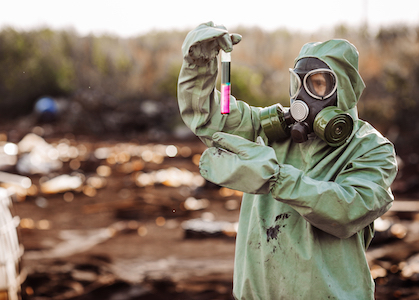The Edgewood Chemical Biological Center (ECBC) recently developed a self-test device that can quickly let troops in the field know whether they have been exposed to biohazards.
The kit then immediately sends test results to field commanders.
The device, entitled SmartCAR, utilizes a colorimetric assay to test for pathogens such as ricin, anthrax or plague. After taking a saliva or stool sample and enclosing it in a vial with a reagent, a small sample is placed on a test strip. The test strip is then tested inside the SmartCAR device, indicating either no exposure (one stripe) or exposure (two stripes). After reading the results, SmartCAR sends the information through Nett Warrior, a system specifically designed for transmitting physical data to smartphones.
If SmartCAR recognizes that a fighter is exposed to a pathogen, Nett Warrior also adds the information to the soldier's medical record. This helps commanders determine whether anyone else has been exposed, their location and whether an area needs to be blocked off. SmartCAR also can provide data on samples from the environment for chemical biologists to analyze, and can test the air through an impinger. Beyond assisting troops against pathogens, SmartCAR also can test water sources and wells, which could be critical in containing Ebola outbreaks and in humanitarian work.
“Although much of the technology in SmartCAR is commercial off-the-shelf, it is a real innovation because it is a handheld, field-ready device that not only determines exposure, but provides its own data management and distribution,” Dr. Patricia Buckley, a SmartCAR research scientist, said.
SmartCAR originally was created by the ECBC for the U.S. Army Telemedicine and Advanced Technology Research Center (TATRC), which works to find more innovative ways to relay data to medics. After ECBC was approached by TATRC, ECBC's Advanced Design and Manufacturing team developed a prototype. After testing by Buckley and her research team, SmartCAR was presented at an Army medical conference to provide a demonstration of SmartCAR's pathogen-identification abilities. After taking suggestions from the conference, ECBC developed the current SmartCAR.
Buckley was enthusiastic about the success of SmartCAR.
“It is exciting to be able to work on something that will actually go out into the field and help soldiers safely accomplish their mission,” Buckley said. “With more time and funding, SmartCAR will be used in more and more settings, such as relief missions and even hospitals.”
ECBC has another device, VOCkit, that functions similarly as SmartCAR, but sends the data to be processed by software that can compare the sample to other samples within a compound library. Buckley said they hope to combine the two technologies to create seemingly limitless possibilities in the field.


 Alerts Sign-up
Alerts Sign-up